| Mar 16 |
Archive for the 'Mind Blind' CategoryThe history of an idea…‘Where do you get your ideas from?’ I’m asked that question at almost every author event. It’s a great question, but there’s no quick easy answer! My ideas don’t come from a place. I don’t think it’s possible to draw a map of where ideas come from. Maybe we need a history of ideas, rather a geography of ideas? Because I can tell you the history of the Spellchasers idea coming to life in my head… All stories start with a spark of an idea, usually a ‘what if…?’ But Molly’s story started with three different sparks, at three different times. Which is probably appropriate for a trilogy! The first spark arrived when I was writing the third novel in the Fabled Beast Chronicles. That must have been in 2010 or 2011 – 6 or even 7 years ago. One of the new characters in Storm Singing was a mermaid called Serena. I had lots of fun writing her, partly because I was never entirely sure whether I liked her or not. And Serena was cursed. She was taking part in the same Sea Herald contest as my main character Rona, because she thought winning would help her to lift the curse on all mermaids. And one little line of Serena’s dialogue made me think about whether there was a right and wrong way to lift a curse, ie whether there were rules of curse-lifting, and I wondered if there was a story in that. But I was still in the middle of editing Storm Singing and I knew there was another Fabled Beast Chronicles book to come, so I just scribbled the thought down and put it to one side. So that was a wee spark, about the rules of curse-lifting. And it sat in my head for a while. Then there was the moment that the story arrived. That wasn’t a spark, that was a firework, exploding in my head. I still remember how it felt. It was in January, 2012, so just over 5 years ago. I was meant to be doing my tax return, but that’s really boring, so instead, I was having fun typing up a list of possible future book ideas. This is a blog post I wrote that day, showing just how excited I was… Rereading the post now is quite odd – I can still remember that physical sense of a story coming to life in my whole body, not just my head. (Also notice how I carefully didn’t give anything away about the details of the idea!) So that was the point when I knew that this idea was strong enough to be a book. But I was still finishing the Fabled Beast series and I knew I wanted to write Mind Blind next. So I put this idea to the side again. But I was really excited about it, and I was sure it was one I was going to write very very soon. However, at that point, the idea was based around a mermaid, not a hare. So it still wasn’t Molly’s story. And then, the third spark: That was also when I knew that I had to write this book as soon as I could. In fact, I never sent the winter hare story (I wrote something else about paper snow) because I knew this character’s adventure wasn’t a short story, it was a novel. But soon, it wasn’t even a novel, because once I went on the curse-lifting workshop with Molly and the others, there was so much story, so much magic, so many questions to answer, that it become a trilogy. And now you can read the trilogy (well, the first two parts anyway!) So that, as far as I can remember it, is the history of how the idea for the Spellchasers trilogy arrived in my head and grew into the story I started to write. But it’s still not a complete answer to the ‘where do you get your ideas from?’ question, because every other novel idea has arrived in a completely different way! Though one common factor is noticing the ideas when they arrive, and remembering to write them down. And the other common factor seems to be that writing stories (or even lists) gives me ideas for other stories! So that’s not a ‘where’, that’s a ‘when’ and a ‘how’ and maybe even a ‘why’… |
| Feb 01 |
Archive for the 'Mind Blind' CategoryRiddling AdventuresI love riddles! And I don’t try to hide my love of riddles: I’ve put riddles in every single one of my novels so far… I shamelessly used the Halloween guising scene in Mind Blind to slip in one of my favourite short riddles. You to look at bit sideyways to find the riddle in Rocking Horse War.
And riddles are an even more important part of the Spellchasers trilogy, because they are an essential part of the life, job and self-image of one of the most important Spellchaser’s characters: Atacama the sphinx.
Where do all these riddles come from? In the folktale and legend retellings, I often use or adapt the original riddles. But for the novels, I always write original riddles. I could probably add riddle-writing to my CV now, I’ve written so many… But why do I write them? There are so many fantastic riddles out there (I know because kids often bamboozle me with ones I haven’t heard!) so why do I make up new riddles? Because the riddles need to fit the story. Sometimes the answers are linked to the plot, sometimes the riddles are designed to allow the characters (usually Innes…) to argue about the answers. Also, I want to surprise readers, rather than give them a riddle they might already know. Also, honestly, I like inventing new riddles. There’s a satisfaction to it, an elegance and a logic that you usually only get with numbers. I sometimes call it maths with words – two of my favourite things together! (Yes, I love maths. I did maths at university. I love algebra and circles and straight lines and triangles and problem-solving… ) Also, one of my daughters is a riddle-master, and sometimes we collaborate on the riddles, which is great fun.
But I don’t just write riddles for books. Last autumn I wrote five new riddles for The Beginner’s Guide to Curses launch, and was very impressed at how fast all the young adventure fans answered them. And now I’ve written three more riddles (with the help of Atacama, of course) for a competition run by my publishers to win a signed copy of the next Spellchasers novel: The Shapeshifters Guide to Running Away. I wonder if you can answer them? Good luck… (I might be doing a few riddle-writing workshops once Shapeshifter’s Guide is published, so keep an eye on my diary if you want to learn my riddle-writing secrets!)
|
| Mar 18 |
Archive for the 'Mind Blind' CategoryVoices in my head; voices in my earsWriters often talk about hearing their characters’ voices in their heads, but last week I heard Ciaran Bain’s voice in my ears, through headphones, along with his scary uncle Malcolm… because I spent a day in a recording studio, watching (and listening) as the RNIB in Glasgow started the process of making an audio book of Mind Blind. As part of the Adapt-ability Audiobook project, run by Publishing Scotland and partly funded by Skills Development Scotland, Mind Blind was chosen to be made into a talking book by the experts at the RNIB studios in Glasgow, and part of the project was that the writer and editor were allowed to watch while the audio book was recorded. And it was a fascinating experience. I was in awe of the skill of Kris Wallace, the producer, and Cameron Mowat, the actor narrating the story. It was also very weird to hear words that I’d written being read, so seriously and dramatically. It didn’t sound exactly the way I expected. There are scenes – the kidnap scene, the first time Ciaran and Lucy meet – which I read out to classes and book festival audiences quite regularly, and I read them in a rhythm that has become familiar to my ears. So hearing Cameron read those scenes in another way was both weird and refreshing. And Cameron added something new to each of the scenes and chapters. He often added a drama or a darkness or an emotion or a danger that I wasn’t even aware I’d written! Listening to him read the scene where one of the characters dies was incredible – I actually felt scared hearing my own words. And the first time I heard Cameron’s deeper growlier Glasgow gangster voice for Uncle Malcolm was quite a shock. In a strange way, hearing someone use their training, skills and talents to tell my story, was like writing picture books (though there are fewer fights in my picture books.) One of the greatest privileges of writing picture books is sending my words away, then seeing the illustrator’s pictures come back. A picture book is not just words with a few pictures stuck on the page to make it pretty. In a picture book the pictures tell the story, the pictures add another layer of creativity, another artist’s view of the story. And watching Kris and listening to Cameron, I realised that their skill and experience, and their interpretation of Mind Blind, was using the sound of the spoken word to add another layer to the story. Just like pictures in a picture book. But listening to Cameron read my words, and stop and start and test out different stresses and emphases, and watching Kris rewind and rerecord again and again, I realised that I don’t always think about whether what I write can be read out loud easily. I frequently read my books out loud as I’m editing them, but mainly to look for clunky phrasing, clichés and repeated words, not to see if it’s possible to read that whole sentence in one breath without tripping over those clashing words. So as Cameron was reading, I kept saying: “Sorry, I should have cut that sentence in two,” or “Oops, I should have put a few more commas in there,” or “My fault! I should have used italics to make the emphasis clearer… “ I do consider the ‘read-out-loud-ability’ of picture books (because I’m imagining an adult with a child on their knee, reading and rereading and rereading, and I want to make that repetition as fun and easy as possible) but I don’t think the same way about the text of a teen novel (because I’m mostly imagining it being read in messy bedrooms, inside someone’s head…) So I did find myself apologising occasionally for ridiculously long stream of consciousness sentences with no obvious opportunity for a reader to take a break or breath. (But even so, if that’s how the characters need to talk and how the story needs to be told, that’s how I’ll write it next time as well. Though I might consider more commas and fewer inadvertent tongue twisters!) Apparently the Mind Blind audio book is going to be unusual, because it will be narrated by two people. I wrote the book with chapters from Ciaran’s point of view and in his voice, but also with chapters from Lucy’s point of view and in her voice, so half the audio book will be narrated by Kirsty Eila McIntyre. I wasn’t able to listen to her days in the studio, unfortunately, but I am very keen to hear what she’s added to Lucy! One final thing that has come out of being in the studio last week – I heard a throwaway comment that the producer made to the actor about one of the minor characters and how that character’s voice should sound, which made me think “aha!” because it confirmed the potential of a direction I’d been considering for a sequel. (Along the lines of ‘oh, if you like that character, it’s probably time I did something horrible to them….’ ) And I’m now absolutely sure that when I’m getting closer to writing the sequel, Cameron and Kirsty’s voices will be the ones I hear in my head! (You’ll be able to hear them soon too – I’m not sure when the audio book comes out, but I’m sure I’ll mention it when it does. And thanks so much to Publishing Scotland, Skills Development Scotland and the RNIB for this brilliant project!) |
| Mar 20 |
Archive for the 'Mind Blind' CategoryMind Blind – ticking none of the usual boxesSo, what is a Lari Don book then? I’ve written 21 books, 6 of them novels, so it’s probably fair to claim that I don’t write just one kind of book. But up until now, there have been a few recognisable threads running through most of my books – if it had magic and myth and fabled beasts and Scottish landscapes, then it might be a Lari Don book. But now I’ve written something totally different to anything I’ve ever written before. Because Mind Blind, my first teen thriller, is published this week. Mind Blind is for older readers. I’ve written picture books (about bottoms and wolves), I’ve written short chapter books (about tigers and wolves), I’ve written adventure books (about dragons and wolves), I’ve written collections of legends (about heroines and wolves). The nearest I’ve come in age so far is novellas for reluctant readers (no wolves, yet). But I’ve not written a full length novel for older readers before and it was a very different book to write. I could do a lot of things I’ve never done before. Swear. Injure people. Kill people. Make texts and smart phones an important part of the plot. Use public transport rather than dragons. And Mind Blind is about a boy. A teenage boy. I’ve written as a boy before – a male phoenix and a blue loon in Maze Running – but only for a couple of chapters. Becoming a teenage boy for months on end was an interesting experience. Also Mind Blind is written in the first person, so we are inside Ciaran’s head, seeing the world through his eyes, all the time. (Except when we’re inside Lucy’s head. This was meant to be a book about Ciaran, but Lucy became so important to the story, that almost half the novel is from her point of view… ) Ciaran Bain is not a goodie either, unlike Helen or Pearl in my other novels. He’s a criminal, he does a lot of dodgy and illegal and even cruel things. And yet I am asking the reader to care about him and what happens to him – which was a bit of a challenge! So. Mind Blind has no magic, it has lots of crime, and it has no lovely Scottish landscapes. No mountains or forests or islands or caves or castles. Mind Blind happens on rooftops and at bus stations and in docklands. It’s not even set completely in Scotland! It starts in London, spends a fair amount of time on a bus (not a fun journey…) then finally ends up in Edinburgh and Leith for the last third of the book. Mind Blind doesn’t tick any of my usual boxes. That is exactly why I wanted to write it. And exactly why I want to hear what you think of it! (Though, as I write this, I realise there is one book which was almost the precursor to Mind Blind, in a tangential way: Drawing a Veil – a novella about a girl who decides to wear the hijab and how her best friend and classmates react. When I wrote it, I did keep thinking – gosh this is tough, solving plot problems without magic! The story also ends on a bridge in an industrial area, just like Mind Blind. In fact, both endings were inspired by the same bridge in Leith, but in both books the bridge has changed slightly to fit the plot. So anyone who’s read Drawing a Veil might have thought that I was heading for teen thriller territory. I didn’t realise it myself when I was writing about Amina though!) I’m always keen to know what readers think about my books. Feedback is very important to writers, and especially so with Mind Blind – because it’s like my very first book all over again! So, if it sounds like your sort of book, please go and read Mind Blind (paperback, ebook, from a shop, from the world-encirling amazon or even FOR FREE from your local library) and let me know what you think! And here is Mind Blind IN A BOX even if it doesn’t tick the usual boxes! |
| Feb 11 |
Archive for the 'Mind Blind' CategoryWhy read a manuscript when you can no longer change it?Today, I’m going to sit down and read Mind Blind, my new teen thriller. Which isn’t that unusual. I’ve been reading, rereading, redrafting and tweaking Mind Blind constantly over the last few months. |
| Dec 12 |
Archive for the 'Mind Blind' CategoryAll Change!2013 has been a weird year for me. I moved house twice and had six books published, but not one of the six was a new novel. So, three beautiful books with great pictures and stories that I’m proud of. I hope I’ve done that before though. Though it was weird writing these stories down! These are stories that I tell all the time in schools and libraries and at book festivals, to show what inspires my fiction, so I was typing exactly what I tell. And I think that’s worked (the books are getting really good reviews and reactions anyway…) It was also a fascinating challenge choosing the right balance of stories – dark and light, long and short, gory and funny, stories from lots of different places – and researching the background to them all. It felt like being a student again, only getting to choose my favourite thing in the world (stories!) to write my essays on. This is another big change for me. Mind Blind is for older readers, it’s not about magic, it has some very nasty characters and some very dark and dangerous scenes. I loved writing it (last year…) I loved editing it (this year, on lots of different floors in lots of different houses) and I am so excited about what readers will think of it (next year!) (And yes, those are not-yet-unpacked boxes in the background of the photos. I’d rather write than unpack…) |
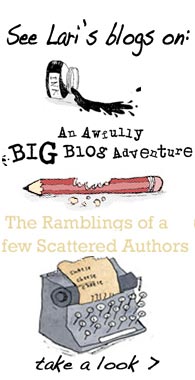
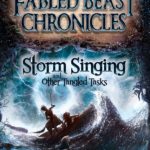

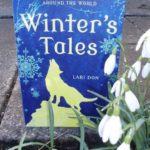
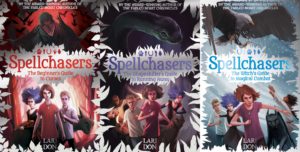
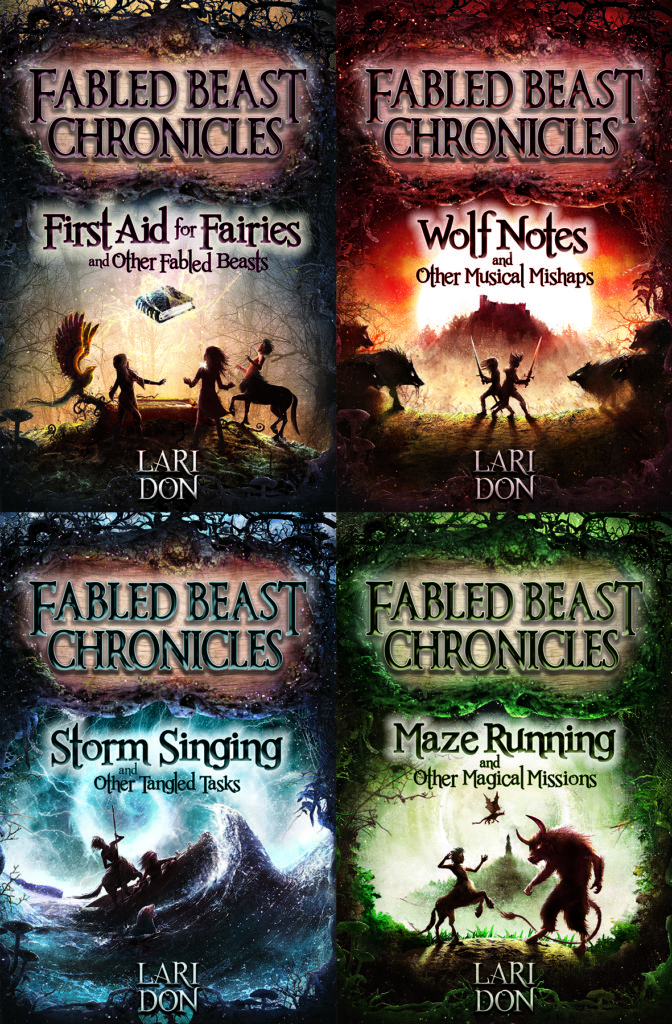
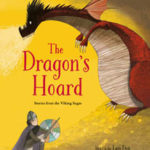
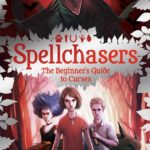
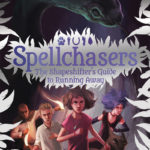

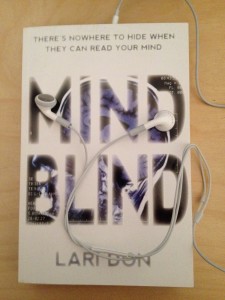
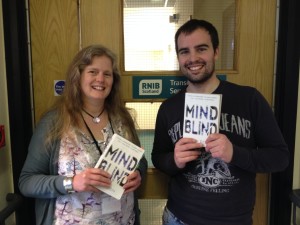
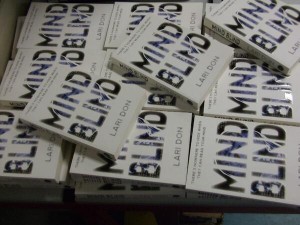
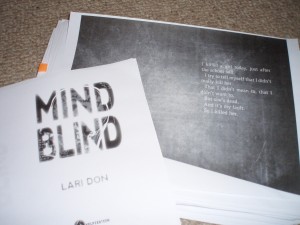
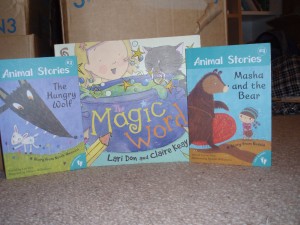
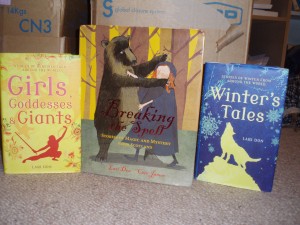
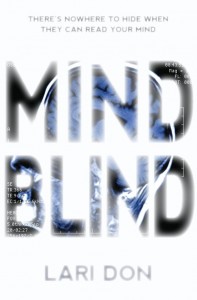
Recent Comments